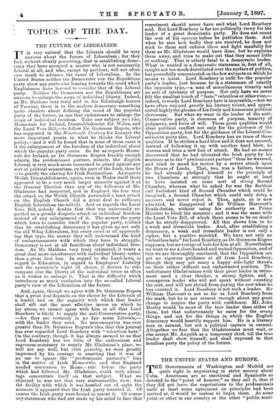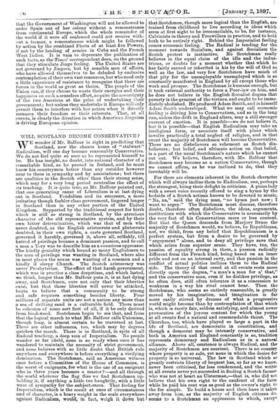THE UNITED STATES AND EUROPE. T HE Governments of Washington and
Madrid are quite right in negotiating in strict secrecy about Cuba. Americans are so emotional and Spaniards so devoted to the "point of honour," as they call it, that if they did not leave the negotiations to the professionals until at least some agreement on principles had been arrived at, it would be useless to begin them. At some point or other in one country or the other "public send- meat" would catch fire, and there would be no road out except through a humiliating retreat or through a possibly ruinous war. We incline to think, however, that . . negotiations, informal and friendly but nevertheless serious, have been going on ; that a new force has inter- vened in the struggle ; and that both Governments, recognising the existence of that force, are much more ready to negotiate than they were. As we read the multi- tude of cautious assertions, hints, and denials which have appeared, the Government of Washington has had an unpleasant surprise. It has discovered, "in the inter- course of diplomatic society," and not through despatches, that in the event of still stronger pressure being applied to Spain, the Government of that country would not find itself without effective allies. The great financiers who are so powerful in Paris are greatly alarmed at the blow which would fall upon them if Spain, after fighting to the bitter end, were compelled to suspend payment of her obligations. They hold most of the Spanish Railway Bonds, as well as much of the Spanish and Cuban Debts, and they have for some time been urging the Government of France to intervene between Wash- ington and Madrid as disinterested mediators. The Em- peror of Germany is sure to approve, for apart from his dreams of colonial expansion, which under certain con- ceivable circumstances could be best gratified in Brazil, he is not fond of American diplomacy, which as regards Germany is apt to be abrupt as well as arrogant, and which one of his journals characterised only two years ago as boorish. The Italian Government considers with justice that its citizens, now so numerous in the United States that they are said in New York to form one-fourth of the working population, are not sufficiently protected, but are treated, especially in all lynching cases or cases of conflict with the police, as if they were negroes, Red Indians, or persons not entitled to the full benefit of the laws. It is not unwilling, therefore, to support Germany in maintain- ing the independence of Spain, while the Austrian Emperor is moved to the same side by family reasons of a weighty character. He does not wish to see the Queen Regent of Spain, who is an Archduchess of his own house, and her son driven from Madrid by a popular revolt because they have been unable to preserve the last of the transmarine possessions of their kingdom. The Triple Alliance, there- fore, and France—that is, the whole Continent with the exception of Russia—is ready to counsel Mr. Cleveland to be moderate, and to avoid threats which Spain could not tolerate, and which might result in a widespread maritime war. We have little doubt that in some carefully honorific way such counsel has been tendered, and that the present American Government, which has throughout looked askance at Cuba, is ready in the absence of menace to accept and act upon it. It will, as it said it would, act as mediator whenever requested by Spain, and will not under the circumstances be entirely biassed to the side of the insurgents. On the other hand, the Spanish Premier has been advised, also informally, by the intervening Powers to make concessions without which he could not be supported, and has accordingly so far receded from his original non possumus attitude, that he is consulting the Powers upon a promise that he will grant some form of autonomy. If that form is acceptable at Washington, the Government there will advise the insurgents to submit ; and as tbe latter have lost their irreconcilable leader, and know that their best hope is in the ultimate intervention of the United States, they may declare the terms satisfactory, accept the amnesty which will accompany the agreement, and return to labour on the plantations. The Cuban rebellion may therefore be a thing of the past even before the accession of Mr. McKinley to the Executive chair.
There may, however, be most serious hitches. The Cuban distrust of Spanish officials is very keen, and is well founded, and the Spanish distrust of Cuban officials is almost insurmountable. It is round that pivot, and probably some questions of finance, that the dispute as to terms will turn. The Spanish Government is ready to concede a Cuban Parliament with legislative power, and control over the finances, including the island tariff, but wants to retain the complete control of the Executive, and the right, whenever it pleases, of garrisoning the island to an extent only limited by its means. Without those Powers, ask the Spanish Ministers, "where is the sovereignty of Spain ? and what is the use of Cuba e"—and to these questions a reply by any Power except Great Britain is at least difficult. We seek nothing from our white Colonies except intimate alliance, but that is regarded on the Continent as either an amiable eccen- tricity or part of a deep-laid design for the monopoly of the world's trade. On the Continent colonies are regarded only as estates. The Spaniards are not satisfiedwith alliance, and it is doubtful if Cubans are prepared to give them more. Their leaders, especially those resident in America, who still hope for independence, say that if the Executive remains Spanish it will remain tyrannical; that the veto reserved to Spain will be exercised whenever legislation is proposed for the benefit of Cuba alone ; and that the garrison will always be called on to put down any resist- ance. As Spanish officials, like French and German officials, do not understand the possession of powers which they are not to use, there is reason in these objections, and we may expect at first to see all negotiations end without result. The pressure of circumstances is, how- ever, very strong. The Americans do not want to wage a war with Europe for the doubtful blessing of holding an island like Cuba, and the Spaniards would gladly get out of their difficulties if they could without any derogation to their pretensions as hidalgos. We imagine, therefore, that some compromise will be found, and that in the end Cuba will possess a government something like that of the United States, where, though the Executive is irre- movable, legislation, taxation, and municipal administration are almost entirely in the hands of the people. The garrison will be limited by consent ; and though there will be con- stant collisions and much discontent, especially about finance, the island will get on fairly well, advancing steadily towards a true autonomy, which Spain, once assured that her "honour "—that is, her national pride— is not threatened, will not be so unwilling to concede. The struggle of races may be kept off if neither are oppressed, and what with publicity and the watchfulness of the local elected Council, the corruption which taints all offices in Havana may be reduced within endurable limits.
These are the results sought, and if they are attained. they will be good alike for Cuba and for the world. It must be beneficial for the island to have some measure of autonomy, for if the Cubans had not been seriously oppressed they would never have faced the total economic ruin with which their insurrection threatens them. And it must be good for Americans to know that they cannot treat the whole of America, continental and insular, as if it were a vast outlying estate in which they had rever- sionary interests entitling them to perpetual interference. They have no just claim to that position derived either from history or from international law, and no power to enforce it if they had. The claim would involve the obligation to accept a protectorate, which they very wisely say they will not be encumbered with, and their force, great as it is, is not greater than that of Europe. They could, of course, conquer any American State they chose, and, it might be, could, if they exerted themselves, defeat, after some preparation, any single European Power, but they cannot defeat all Europe combined, even if England, for reasons of kinship, agrees to look on without favouring either side. Invasion is impossible in face of the masses of the conscript armies, and to wage a successful war at sea the Union must raise her fleet at least to a level with that of Great Britain, and engage and train at least seventy thousand sailors. What have the Americans to gain through war which would justify an effort of that kind, or even induce her masses to make the necessary sacrifices ? They would be no nearer the possession of any fresh division of their own continent than they are now, while there is nothing in Europe, or the dependencies of Europe outside Canada, which they even think that they would like to possess. Such an effort would be a folly, yet it is towards such an effort that all recent diplomacy of the Republic has manifestly tended. The rulers at Washington have put forward a claim which is manifestly one of sovereignty throughout the Western Hemisphere, while rejecting even with contumely all obligation to keep that hemisphere a. part of the civilised domain. That position is impossible. This journal, which is perhaps their most friendly advo- cate on this side of the Atlantic, and which risked extinction to defend their right to unity, has repeatedly warned them of the danger they were incurring, and now it shows signs of immediate arrival. It does not matter one straw whether Mr. Olney has or has not had to answer " friendly " despatches. The fact remains patent to all who have CYCS that the Government of Washington will not be allowed to order Spain out of her colony without a remonstrance from continental Europe, which the whole remainder of the world if it were all coalesced could not receive with- out a tremor, a remonstrance which might be followed by action by the combined Fleets of at least five Powers, if not by the landing of armies in Cuba and the French West Indies. It is vain to deprecate the publication of such facts, as the Times' correspondent does, on the ground that they stimulate Jingo feeling. The United States are not governed by Jingoes, but by sensible men of affairs, who have allowed themselves to be deluded by exclusive contemplation of their own vast resources, but who need only a little experience of resistance to recognise that there are forces in the world as great as theirs. The people of the Union can, if they choose to waste their energies and their happiness on such a senseless effort, acquire the sovereignty of the two Americas at the price of undertaking their government; but unless they undertake it Europe will only permit them to interfere with her action when it directly menaces their freedom or their interests. That, at all events, is clearly the direction in which American Jingoism is driving European opinion.
















































 Previous page
Previous page